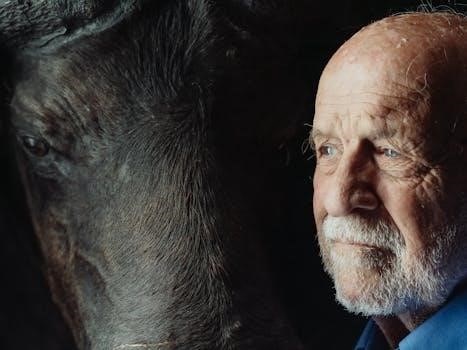instructions for living a life mary oliver
Category : Instructions
Mary Oliver’s philosophy centers on living a “wild and precious life,” advocating for personal autonomy․ She emphasizes not letting others dictate one’s path, encouraging whimsy, and taking responsibility for one’s own journey․ Her work provides a roadmap for a life filled with joy and authenticity․
The Wild and Precious Life
Oliver’s concept of a “wild and precious life” is a call to embrace existence fully and without reservation․ It’s about rejecting the mundane and seeking out experiences that ignite the soul․ This philosophy encourages individuals to live authentically, according to their own values and desires, rather than conforming to societal expectations․ It’s a life where one is not constrained by the opinions or limitations imposed by others․ It’s about understanding that life is fleeting and precious, urging us to make the most of each moment․ She stresses the importance of not giving others the responsibility for our own lives, instead taking ownership of our choices and actions․ It’s about allowing ourselves to love what we truly love, to build our lives on foundations of genuine passion and connection․ Furthermore, Oliver pushes us to not stop being whimsical, to retain a childlike sense of wonder and joy throughout our lives․ She urges us to seek out the extraordinary within the ordinary, to find beauty and meaning in the everyday․

Key Themes in Oliver’s Work
Oliver’s poetry explores themes of personal responsibility, emphasizing self-reliance and autonomy․ She celebrates whimsy and joy, urging readers to find delight in life’s simple moments․ Love and connection are also central, reflecting her deep appreciation for relationships․
Personal Responsibility
A cornerstone of Mary Oliver’s philosophy is the concept of personal responsibility․ She firmly believed that individuals are the sole architects of their own lives, and that we should not relinquish control to external forces or the expectations of others․ Her work consistently emphasizes the importance of making conscious choices that align with one’s true self․ This involves a deep understanding of one’s desires, passions, and values, and a commitment to living in accordance with them․
Oliver’s poems often encourage readers to take ownership of their experiences, both positive and negative, and to learn from them․ She underscores the need to be proactive in shaping our own destinies, rather than passively accepting circumstances․ This responsibility extends to our relationships, our actions, and our interactions with the world around us․ It is a call to embrace our power and potential, and to live a life of purpose and intention, free from the influence of others’ judgements or opinions․ Oliver’s message is clear⁚ your life is yours to create and you should always be in control of it․
Whimsy and Joy
Mary Oliver’s work is imbued with a deep appreciation for whimsy and joy; She encourages readers to embrace the playful aspects of life, to approach the world with childlike curiosity, and to find delight in the simple, everyday moments․ Her poems often capture the magic of nature, from the flutter of a butterfly to the vibrant colors of a sunset, and she invites us to see the world through a lens of wonder․ She believed in the importance of not losing our sense of playfulness and the capacity to be surprised by the beauty that surrounds us․
Oliver’s emphasis on whimsy is not merely about lightheartedness; it is also a call to resist the pressures of conformity and to cultivate a sense of individuality․ She encourages us to follow our own unique paths, to pursue our passions, and to express ourselves authentically․ This involves embracing the unusual, the unexpected, and the unconventional․ She prompts us to find joy in the unexpected detours and the beauty of imperfection, fostering a life enriched by moments of spontaneous delight․ In her view, joy is not a luxury but a necessity for a fulfilling existence․
Love and Connection
Mary Oliver’s perspective on love and connection extends beyond human relationships, encompassing a profound connection with the natural world․ She views nature as a source of solace, inspiration, and a place where one can experience deep and meaningful bonds․ Her poems often depict moments of profound communion with animals, plants, and landscapes, revealing a deep sense of interconnectedness․ Oliver encourages us to cultivate a sense of belonging with the world around us, recognizing that we are part of a larger web of life․ She emphasizes that true connection stems from a place of openness and vulnerability․

Furthermore, Oliver highlights the importance of love in its various forms, whether it be romantic, familial, or platonic; She acknowledges that love can be both beautiful and challenging, but that it is through these experiences that we grow and learn․ She encourages us to love deeply, to forgive freely, and to appreciate the beauty of human relationships․ She also emphasizes self-love as a fundamental aspect of a fulfilling life․ In her view, love is the key to a rich and meaningful existence, providing both joy and support․ Her work urges us to seek out genuine connections that nurture the soul․

Practical Lessons from Mary Oliver
Oliver’s work provides practical guidance for life, emphasizing unlearning past pains and embracing nature as a guide․ She advocates for living in the present, encouraging individuals to find joy and meaning in everyday experiences․
Unlearning Past Pain
Mary Oliver’s teachings strongly suggest the importance of actively unlearning the painful lessons from our past experiences․ This involves a conscious effort to release the burdens of old hurts and limiting beliefs that can hinder our present joy․ Oliver implicitly encourages us to grant ourselves permission to love what we love without the constraints of past conditioning or external judgments․ This process is not about erasing history but about reframing our relationship with it, allowing us to move forward with greater freedom and authenticity․ By shedding the shackles of past pain, we create space for new experiences and perspectives, fostering a life built on a foundation of self-love and acceptance․ The key is to recognize that past wounds do not define us and that we have the power to choose a different path, one that is guided by joy and personal fulfillment․ Oliver’s poetry often serves as a gentle reminder that we are capable of healing and that we deserve to live a life unburdened by the shadows of yesterday․ This freedom is essential to living a truly “wild and precious” life․
Nature as a Guide
Mary Oliver frequently uses nature as a profound guide for living a fulfilling life, suggesting that the natural world holds vital lessons for human existence․ Her poems often depict scenes of animals, plants, and landscapes, not just as beautiful backdrops but as teachers offering wisdom about resilience, acceptance, and the interconnectedness of all things․ Oliver encourages us to observe nature closely, to notice the subtle shifts in seasons, the intricate details of a flower, or the rhythm of the tides․ Through these observations, we can gain a deeper understanding of our place in the world and our relationship to the larger ecosystem․ Nature, in Oliver’s view, provides a template for how to live in harmony with ourselves and with our surroundings․ She sees the wilderness as a space where we can shed our societal masks and connect with our true selves․ It’s in the quiet moments of communion with nature that we can find solace, inspiration, and a sense of belonging․ By turning to nature as a guide, we are reminded of the beauty and fragility of life, prompting us to live with more intention, gratitude, and awe․ This connection helps us to understand our own wild and precious nature․
Embracing the Present
Mary Oliver’s work frequently emphasizes the importance of embracing the present moment as a key to a fulfilling life․ She encourages readers to shed the weight of past regrets and anxieties about the future, instead focusing on the here and now․ This theme is evident in her vivid descriptions of the natural world, where each moment is unique and fleeting․ Oliver invites us to notice the small, everyday miracles that surround us ― the flight of a bird, the rustle of leaves, or the warmth of the sun on our skin․ By fully engaging with these sensory experiences, we can cultivate a deeper appreciation for life’s simple pleasures․ She suggests that it is within the present moment that we find true joy and meaning․ This focus on presence is not merely about passive observation, but about active participation in the world․ Oliver prompts us to ask ourselves, “What will you do with your one wild and precious life?” This question is a call to action, urging us to make the most of each moment, to live with intention, and to fully experience the beauty of our existence․ By grounding ourselves in the present, we can find peace, clarity, and a renewed sense of purpose․

Oliver’s Impact and Legacy
Mary Oliver’s legacy lies in her ability to provide a blueprint for living joyfully․ Her work encourages finding happiness in the everyday, reflecting on mortality, and embracing a life filled with wonder and appreciation for the natural world․
A Blueprint for Living
Mary Oliver’s work offers a profound blueprint for navigating life with intention and joy․ Her poems and essays serve as a guide, encouraging readers to craft their own unique paths, unburdened by societal expectations or the dictates of others․ Oliver’s vision emphasizes the importance of personal responsibility, urging individuals to seize control of their lives and make choices aligned with their authentic selves․ This blueprint involves embracing whimsy and joy, fostering a sense of playfulness and wonder in the face of daily life․ It’s a call to actively participate in one’s own existence, rather than passively accepting a predetermined role․ Oliver’s writings provide a framework for building a life grounded in love, connection, and an abiding appreciation for the natural world, reminding us that each moment is an opportunity for growth and discovery․ This roadmap encourages a conscious and deliberate approach to living, inspiring readers to find their own unique rhythm and meaning in the world, and to do so with passion and purpose․
Finding Joy in Everyday Life
Mary Oliver’s work illuminates the path to finding joy in the seemingly mundane aspects of everyday life․ She encourages a perspective shift, urging us to actively seek out moments of wonder and beauty in the world around us․ This approach isn’t about ignoring challenges, but rather about cultivating an awareness that allows us to notice the extraordinary within the ordinary․ Oliver’s poems often highlight the simple pleasures found in nature, from the flutter of a butterfly to the gentle flow of a river, demonstrating that joy is not a distant goal but a readily available experience․ Her teachings emphasize the importance of being present, of fully engaging with each moment, and of opening ourselves to the small miracles that often go unnoticed․ This perspective transforms routine into potential, infusing our days with a sense of gratitude and appreciation for the inherent richness of existence․ By embracing Oliver’s vision, we learn to recognize that joy is not something to be pursued, but rather something to be cultivated and celebrated within the fabric of our daily lives, and the ability to see it is the gift․
Reflection on Mortality
Mary Oliver’s work often grapples with the theme of mortality, not as a source of fear, but as a catalyst for appreciating the present moment․ She encourages a deep awareness of our finite existence, urging us to make the most of our “one wild and precious life․” Her poems don’t shy away from the reality of death; instead, they use it as a backdrop against which the vibrant colors of life are painted more vividly․ This awareness of mortality fuels her call to live fully, to embrace experiences, and to connect deeply with the world․ Oliver’s perspective suggests that by acknowledging the ephemeral nature of our time, we can break free from trivial concerns and focus on what truly matters․ She inspires us to engage passionately with life, to find joy in the small things, and to build a legacy of love and connection․ Ultimately, her reflections on mortality serve not as a morbid reminder, but as a powerful motivation to live with intention, purpose, and gratitude, savoring every fleeting moment․
